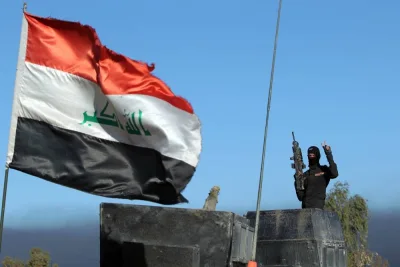
People take to the streets of the Yemeni Red Sea city of Hodeidah, to condemn the overnight US and British forces strikes on Houthi rebel-held cities, yesterday.
Yemen’s Houthis said yesterday that US and British interests were “legitimate targets” after they launched deadly strikes against the rebels following weeks of disruptive attacks on Red Sea shipping.
The barrage of strikes early yesterday against the Houthis, who say they are acting in solidarity with Palestinians in Gaza, stoked fears of the Israel-Hamas war spilling over across the region.
Violence involving Iran-aligned groups in Yemen, Lebanon, Iraq and Syria has surged since the war in Gaza began in early October.
Britain, the US and eight allies said the strikes aimed to “de-escalate tensions”. But Iran and other governments condemned the Western action or warned that unrest could worsen.
The UN Security Council was due to hold an emergency meeting on the strikes, days after adopting a resolution demanding the Houthis immediately stop their attacks.
The Houthis have intensified attacks on what they deem Israeli-linked shipping in the Red Sea — through which 12% of global maritime trade normally passes — since Hamas’ unprecedented storming of Israel in the first week of October.
The rebels have controlled much of Yemen since a civil war erupted in 2014 and are part of an “axis of resistance” against Israel and its allies.
“All American-British interests have become legitimate targets” for the Houthis following the strikes, the rebels’ Supreme Political Council said.
Hussein al-Ezzi, the rebels’ deputy foreign minister, said the US and Britain “will have to prepare to pay a heavy price”.
US President Joe Biden called the strikes a successful “defensive action” after the “unprecedented” Red Sea attacks and said he “will not hesitate” to order further military action if needed.
British Prime Minister Rishi Sunak said the Houthis’ breach of international law merited a “strong signal” in response, with his government later publishing its legal position saying the strikes were lawful and “proportionate”.
Nasser Kanani, spokesman for Iran’s foreign ministry, said the Western strikes will fuel “insecurity and instability in the region” while “diverting” attention from Gaza. Hamas said it will hold Britain and the US “responsible for the repercussions on regional security”.
But the White House said the US was not seeking conflict with Iran, with National Security Council spokesman John Kirby telling MSNBC there was “no reason” for an escalation.
Hundreds of thousands, some carrying Kalashnikov rifles, gathered in Yemen’s capital Sanaa in protest, many waving Yemeni and Palestinian flags and holding portraits of Houthi leader Abdulmalik al-Huthi, an AFP journalist reported. “Death to America, death to Israel,” they chanted.
In Tehran, hundreds of people rallied against the US, Britain and Israel while voicing support for Gazans and Yemenis.
Protesters also marched in the Gulf state of Bahrain, home base of the US Fifth Fleet.
In Gaza, Palestinians lauded Houthi support and condemned Britain and the US for their military response.
Turkish President Recep Tayyip Erdogan described the strikes as disproportionate and said: “It is as if they aspire to turn the Red Sea into a bloodbath.”
The barrage of strikes early yesterday against the Houthis, who say they are acting in solidarity with Palestinians in Gaza, stoked fears of the Israel-Hamas war spilling over across the region.
Violence involving Iran-aligned groups in Yemen, Lebanon, Iraq and Syria has surged since the war in Gaza began in early October.
Britain, the US and eight allies said the strikes aimed to “de-escalate tensions”. But Iran and other governments condemned the Western action or warned that unrest could worsen.
The UN Security Council was due to hold an emergency meeting on the strikes, days after adopting a resolution demanding the Houthis immediately stop their attacks.
The Houthis have intensified attacks on what they deem Israeli-linked shipping in the Red Sea — through which 12% of global maritime trade normally passes — since Hamas’ unprecedented storming of Israel in the first week of October.
The rebels have controlled much of Yemen since a civil war erupted in 2014 and are part of an “axis of resistance” against Israel and its allies.
“All American-British interests have become legitimate targets” for the Houthis following the strikes, the rebels’ Supreme Political Council said.
Hussein al-Ezzi, the rebels’ deputy foreign minister, said the US and Britain “will have to prepare to pay a heavy price”.
US President Joe Biden called the strikes a successful “defensive action” after the “unprecedented” Red Sea attacks and said he “will not hesitate” to order further military action if needed.
British Prime Minister Rishi Sunak said the Houthis’ breach of international law merited a “strong signal” in response, with his government later publishing its legal position saying the strikes were lawful and “proportionate”.
Nasser Kanani, spokesman for Iran’s foreign ministry, said the Western strikes will fuel “insecurity and instability in the region” while “diverting” attention from Gaza. Hamas said it will hold Britain and the US “responsible for the repercussions on regional security”.
But the White House said the US was not seeking conflict with Iran, with National Security Council spokesman John Kirby telling MSNBC there was “no reason” for an escalation.
Hundreds of thousands, some carrying Kalashnikov rifles, gathered in Yemen’s capital Sanaa in protest, many waving Yemeni and Palestinian flags and holding portraits of Houthi leader Abdulmalik al-Huthi, an AFP journalist reported. “Death to America, death to Israel,” they chanted.
In Tehran, hundreds of people rallied against the US, Britain and Israel while voicing support for Gazans and Yemenis.
Protesters also marched in the Gulf state of Bahrain, home base of the US Fifth Fleet.
In Gaza, Palestinians lauded Houthi support and condemned Britain and the US for their military response.
Turkish President Recep Tayyip Erdogan described the strikes as disproportionate and said: “It is as if they aspire to turn the Red Sea into a bloodbath.”
 Kokani.me Kokani.me
Kokani.me Kokani.me



